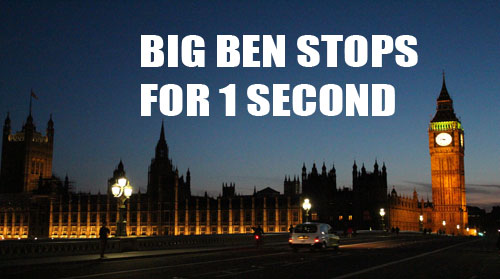
The most famous clock in the world, Big Ben will have a second added to its time tonight. (By the way, have you seen Big Ben in our Must See Sights of London interactive map and also the included essential English phrases for visitors to London?)
In fact it's not just London which will have it's time altered today. Every clock and computer around the world will have one second added to their time, with digital readouts showing the extremely weird 11:59:60 before they revert to the normal midnight showing of 00:00:00.
Why is 1 second being added to time?
World timekeepers are adding a "leap second" to atomic clocks which means that time will basically stop and hold its breath for one second.
This will help the rotation of the Earth to catch up (the Earth is very gradually turning round more slowly) with atomic clocks. Therefore, the synchronisation of night and daytime will remain perfectly in match
As the English idiom says 'Time and tide wait for no man' meaning that nothing on Earth can stop time and it will not wait for anyone. Well on Tuesday 30th June, 2015, time will wait, if only for one single 'leap second'.
This might not seem like a big deal for you, but for companies and electronic financial markets around the world a 61 second minute could be a huge problem. The last time that a a second was added to time in 2012, there were massive computer crashes and glitches around the world, with some big websites like LinkedIn and Mozilla experiencing outages. Quantas Airlines in Australia had many flights grounded because their check-in system went down and required a manual correction.
A senior scientist from the National Physical Laboratory, which is the UK institution responsible for defining Greenwich Mean Time said that: There are consequences to playing with time because leap seconds are only infrequently introduced, it is difficult to incorporate them in computer systems and mistakes can cause systems to fail temporarily.
Why do we need to add leap seconds?
Leap seconds have been added to global timing for over 40 years, since 1972, and this 2015 disruption is the 27th addition. Atomic clocks are approximately one million times more accurate than the revolving Earth which is slowing.
The decrease in in Earth's revolution speed is a result of "moon drag". The gravity of the moon dragging the world's oceans backwards and forwards all the time creates a dragging effect between the water and the world's oceans floors. An expert astronomer from the Royal Observatory Greenwich in London described this as being "like giant brake pads which over millions of years causes the Earth's rotation to slow down".
So, apparently, computers don't like an unusual extra second, but if there were no added leap seconds, time as created by humans would gradually fall out of synch with the Earth's rotation and after about 800 years the sun would reach it's highest point in the sky at 1pm in the afternoon as opposed to the expected 12 middday.
When has Big Ben stopped in history?
- 1916 - 1918
- The bells did not sound for two years during WWI and the clock face was not illuminated at night to prevent attack from German Zeppelin bombers
- 1939 - 1945
- The clock faces were not lit during night time to prevent being a 'guide' for German bomber pilots
- 3 - 4 June 1941
- a 24 hour stoppage of the clock after a workman who was repairing damage to the clock face dropped a hammer inside the workings of the clock.
- 1949
- The clock slowed down by 4 and a half minutes after a flock of birds rested on the minute hand
- 31st January 1962
- The clock slowed because of heavy snow and ice on the minute hands. As a result, the New Year chimes at midnight were 10 minutes late!
- 30 January 1965
- The bells were made silent for the funeral of WInston Churchill
- 5th August 1976
- The first ever breakdown - The clock was shut down for 26 days during a period of nine months while repairs were made to the broken chiming mechanism
- 27 May 2005
- Due to very hot weather of nearly 32 degrees Celsius the clock stopped at 10:07 p.m. then it started again but stopped mysteriously for 90 minutes at 10:20 before starting to tick again
- 29th October 2005
- The clock was stopped for 33 hours to have essential maintenance
- 11th August 2007
- A stoppage of six weeks for maintenance work to the Great Bell
- 17th April 2013
- The bells were made silent for the funeral of Margaret Thatcher

